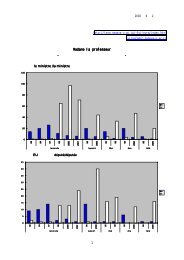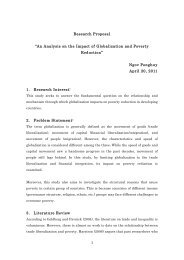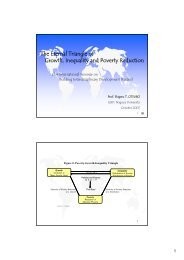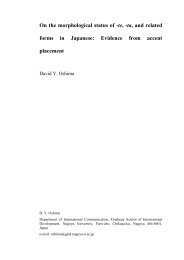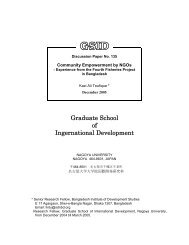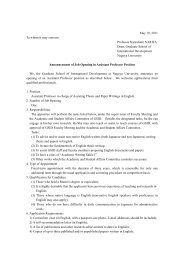Report
Report
Report
You also want an ePaper? Increase the reach of your titles
YUMPU automatically turns print PDFs into web optimized ePapers that Google loves.
166 QUANTIFICATION OF BENEFITS FROM ECONOMIC COOPERATION IN SOUTH ASIA<br />
the commitments, countries would therefore like to<br />
persevere with the existing classification of the GATS,<br />
even though it is recognised to be out of date. For<br />
example, in the Indo-Singapore CECA (signed on 29<br />
June 2005 and came into force on 1 August 2005),<br />
telecommunication services are defined following a<br />
positive list approach, like in the GATS. 6<br />
RELEVANT PROVISIONS OF GATS AND<br />
OTHER RULES AND DISCIPLINES FOR<br />
TELECOMMUNICATIONS<br />
The WTO rules and disciplines for telecom comprise<br />
the GATS, the Annex on Telecommunications<br />
(hereinafter the Annex) and the Schedules of commitments<br />
made under the GATS. In addition, the Reference<br />
Paper provides the basic thrust of major regulatory<br />
disciplines that are relevant to telecom services. The<br />
Annex recognises ‘the specificities of the telecommunications<br />
service sector and, in particular, its dual role as<br />
a distinct sector of economic activity and as the underlying<br />
transport means for other economic activities’, i.e.<br />
importance of telecommunications as an input for other<br />
sectors.<br />
The Annex comprises seven sections, with the core<br />
obligations contained in the section on access to and<br />
use of ‘public telecommunications transport network<br />
and services’ (or PTTNS). These require WTO members<br />
to ensure that access to and use of the PTTNS are<br />
allowed on reasonable and non-discriminatory terms<br />
for the supply of services included in its schedules. This<br />
would be true even when no basic telecom service<br />
commitments have been made by the government in<br />
its schedule, and whether or not such PTTNS is supplied<br />
by a monopoly or through competition. Inasmuch as a<br />
Commitment in a Member’s schedule on basic telecom<br />
services is for the supply of these services, access to<br />
and use of PTTNS on reasonable and nondiscriminatory<br />
terms is a mandatory requirement under<br />
the provisions of this Annex. In addition, there is<br />
recognition of the need for maintaining security and<br />
confidentiality of messages, safeguarding universal<br />
service and other public obligations, and protection of<br />
the technical integrity of the networks.<br />
Several governments felt that explicit regulatory<br />
principles should be drawn up for basic telecom<br />
services, particularly in order to guard against anticompetitive<br />
behaviour by incumbents. This was based<br />
on the view that the telecom sector normally has a<br />
dominant supplier who could alter the market situation<br />
to the disadvantage of a newcomer. Further, an<br />
Table 15.2 WTO Reference Paper: Definitions<br />
and Principles<br />
Definition/Principles<br />
Definitions<br />
Description<br />
The Reference Paper applies rules to<br />
‘major suppliers’ of telecommunications<br />
services who have ‘control over<br />
essential facilities’ or uses its position<br />
to ‘materially affect the terms of participation’.<br />
Competitive Governments must take appropriate<br />
Safeguards<br />
measures to prevent suppliers of telecommunications<br />
services from using<br />
anti-competitive practices such as<br />
cross-subsidisation, apply information<br />
obtained from competitors in an uncompetitive<br />
manner, or denying competitors<br />
access to relevant technical<br />
information.<br />
Interconnection Governments must ensure that major<br />
suppliers provide interconnection of<br />
their networks to other service suppliers<br />
at ‘any technically feasible point in the<br />
network’. Major suppliers will offer<br />
interconnection that is non-discriminatory,<br />
timely, and at a rate and quality<br />
‘no less favourable’ than that provided<br />
for its own subsidiaries or affiliates.<br />
Universal Service Governments may set universal service<br />
obligations, as long as they are administered<br />
in a transparent, non-discriminatory,<br />
competitively neutral manner and<br />
are not more burdensome as necessary<br />
in reaching their policy objectives.<br />
Transparency Under circumstances where licenses<br />
are required, the licensing criteria,<br />
timeframe, and terms and conditions<br />
are to be made publicly available.<br />
Upon the request of the applicant, the<br />
reasons for denial of a license will be<br />
made known.<br />
Independent The regulatory body must be separate<br />
Regulators<br />
and not accountable to any supplier of<br />
basic telecommunications services and<br />
that its procedures be impartial.<br />
Allocation and Use Government procedures for the allocaof<br />
Scare Resources tion and use of scare resources, such<br />
as frequencies and numbers, must be<br />
objective, timely, transparent and nondiscriminatory.<br />
Source: Compiled from www.wto.org<br />
6<br />
A positive list approach gives countries the flexibility to choose the sectors/sub-sectors and modes within those sectors/subsectors<br />
for making commitments.






